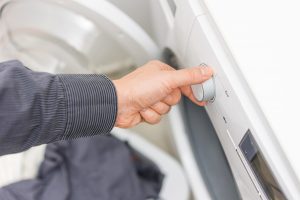
Cold water versus hot water matters when you’re taking a shower, and also when you’re doing laundry. Your clothes may not jump around when dropped into a stream of cold water the way you would if you stepped in before the water warmed up, but it can affect them. It’s especially important in facilities that process laundry for public industries such as healthcare and hospitality, or other industries that use a commercial washer in Raleigh, NC frequently.
There are many theories about using cold or hot water for laundry, so let’s take a look at a few of them to see what works best for your situation.
Cold Water Perks
Cold water saves money on energy because you’re not heating up the water before you do laundry. You have less risk of ruining fabrics because dark and bright colors won’t fade as much.
Cold Water Downsides
Cold water is heavier than hot, so it weighs down the fabrics more so than warm water. This means they will require a longer drying time. You’ll need to use more detergent when you wash clothes in cold water below 60 degrees because it doesn’t do its job as well in cooler water. When you wash clothes in cold water, stains may not come out the first time, which means you’ll be washing it again and that’s not efficient.
Hot Water Perks
Hot water kills germs. If your items are heavily soiled, hot water will get those stains out. Using hot water means you can use less detergent and run a shorter wash cycle. Warm water is lighter than cold, so it won’t soak into your clothes and make then harder to dry.
Hot Water Downsides
Washing brightly colored fabrics or denim in hot water will cause bleeding and fading. Your clothes may shrink if you wash them in hot water, especially knits and man-made fibers. It takes more energy than cold because the water needs to be heated before the load is processed.
Conclusion
Don’t forget warm water! You don’t have to go to either extreme to wash your clothes. A warm water setting should give good cleaning results with less fading and shrinking. Man-made fibers, knits and denim can hold up well in warm water.
If you run a facility in an industry such as healthcare, there are recommendations from the Centers for Disease Control (CDC) that say the temperature should be 160 degrees in order to kill germs and prevent the spread of bacteria. They also suggest that chlorine bleach should be used.
Another factor to consider when deciding what temperature to use is the care instructions on your clothing or linens. Following these directions can help minimize fading and shrinking.
Remember that you’re not limited to one temperature, so use what works best for each load of laundry that you do.
Buying a Commercial Washer in Raleigh, NC, Is Easy with T & L!
Do you do a lot of laundry at home? If you are interested in learning more about an industrial sized dryer or commercial washer in Raleigh, NC for your home, we are here to help. Call the experts at T & L Laundry Equipment so they can help you make the right choice for your needs. They have been in business for 40 years, so they know a thing or two about laundry equipment. You can be confident that they can provide you with equipment recommendations that will help make life a little easier for you and your family.

